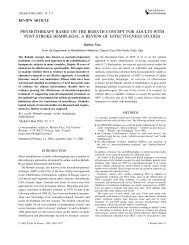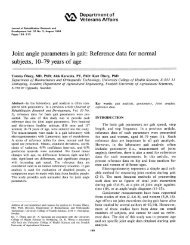Successful Ministry to the Retarded[ETowns] - Elmer Towns
Successful Ministry to the Retarded[ETowns] - Elmer Towns
Successful Ministry to the Retarded[ETowns] - Elmer Towns
- No tags were found...
Create successful ePaper yourself
Turn your PDF publications into a flip-book with our unique Google optimized e-Paper software.
An accurate definition of <strong>the</strong> "trainable mentally retarded" (TMR) must include<strong>the</strong> perspectives of medicine, psychology, sociology, education and religion. TheSunday school teacher will need <strong>to</strong> know how <strong>the</strong> composite of <strong>the</strong>se characteristicswill finally affect pupil performance and potential.Persons classified as trainables* have been defined as having IQs ranging from30 <strong>to</strong> 55. 1 They are uneducable in terms of academic skills and will requiresupervision throughout <strong>the</strong>ir life-span. Many can learn <strong>to</strong> read signs for <strong>the</strong>ir ownprotection (such as GO, STOP, LADIES, MEN), <strong>to</strong> count and use numbers in alimited way. Their usual training program stresses primarily help in self-care, socialhabits, and adjustment <strong>to</strong> environment.*Classifying <strong>the</strong> child as trainable according <strong>to</strong> IQ level is not without itshazards, for IQ for <strong>the</strong> trainable is not clearly defined and can range from 25-55.PHYSICAL AND BEHAVIORAL CHARACTERISTICSRetardation may begin in <strong>the</strong> prenatal stage of life, or in preconception in <strong>the</strong>case of hereditary deficiency. 2 It also can occur following birth as a result ofdisease or injury. The effects of prenatal mental deficiency make <strong>the</strong>mselves feltslowly. The child grows more slowly, matures with more difficulty, and retainsinfant habits longer. Parents may not notice differences in a child until <strong>the</strong> timewhen he should begin <strong>to</strong> speak. Although slowness <strong>to</strong> speak does not indicateretardation, it can be a symp<strong>to</strong>m of something serious; so it should not gounheeded. Previously <strong>the</strong> child may have seemed <strong>to</strong> be developing normally.The clues <strong>to</strong> a child's intelligence level show up when he begins verbalizing histhoughts. Parents are alerted that something is ei<strong>the</strong>r physically or mentally wrongwhen <strong>the</strong>ir child does not try <strong>to</strong> talk. Some doc<strong>to</strong>rs add <strong>to</strong> <strong>the</strong> problem by assuring<strong>the</strong> parent, "Johnny will be all right; he's just a bit slow. Come back in a year, andprobably he will have snapped out of it." As a result, reality is not faced until <strong>the</strong>child is of school age.Trainables are all physically handicapped in that <strong>the</strong>ir sight, hearing, speech,and general coordination have been diminished <strong>to</strong> some degree as a result of <strong>the</strong>irbrain injury. Such a pupil rarely speaks as naturally or as easily as a normal childbecause his brain does not au<strong>to</strong>matically transmit <strong>the</strong> complicated signals whichtrigger <strong>the</strong> intricate muscle action needed for articulation. If <strong>the</strong> speech centers inhis brain have indeed been extensively damaged, be will be motivated <strong>to</strong> good useof his voice only after his parents, teachers and <strong>the</strong>rapists spend long hours traininghim in <strong>the</strong> art of communication.


![Successful Ministry to the Retarded[ETowns] - Elmer Towns](https://img.yumpu.com/47721906/12/500x640/successful-ministry-to-the-retardedetowns-elmer-towns.jpg)













